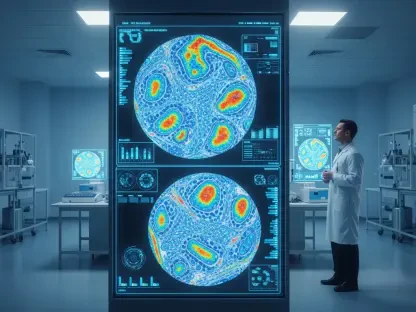In today’s healthcare landscape, data is more abundant than ever. Hospitals, research institutions, and medical professionals collect vast amounts of information—from patient histories and lab results to imaging scans and clinical trial data. However, the sheer volume and complexity of this data make it a significant challenge to decipher actionable insights. This is where artificial intelligence (AI) becomes a game-changer, transforming how we manage, interpret, and utilize healthcare data to optimize patient care and improve outcomes.
AI Organizing Complex Medical Data
Managing and Interpreting Data
The influx of data generated daily in healthcare encompasses a wide array of sources, including electronic health records (EHRs), diagnostic images, genomic sequences, and outputs from wearable devices. This massive volume of information creates an urgent requirement for systems capable of efficiently managing and interpreting the data. AI rises to this challenge by employing advanced techniques such as machine learning and natural language processing (NLP) to parse through unstructured medical records, identify key information, and categorize it for easier understanding.
For example, AI systems can process and analyze complex genomic data to identify mutations linked to specific diseases, enabling personalized treatment plans. Similarly, machine learning algorithms can extract pertinent details from EHRs, helping clinicians quickly identify critical patient information and potential health risks. By automating these tasks, AI significantly reduces the time and effort required to manage large datasets, allowing healthcare professionals to focus on providing high-quality patient care.
Enhancing Diagnostic Processes
AI-powered medical imaging tools have revolutionized the way radiologists and other specialists approach diagnostics. Traditionally, medical professionals would manually review each imaging scan, a time-consuming process prone to human error. AI technologies can analyze thousands of scans rapidly, detecting subtle abnormalities that may go unnoticed by human eyes. For example, AI algorithms can identify early signs of cancer, cardiovascular disease, and neurological disorders with remarkable accuracy, providing valuable insights to guide treatment decisions.
These advancements not only expedite the diagnostic process but also enhance the precision of medical evaluations. AI’s ability to highlight areas of concern enables radiologists to focus their attention on the most critical aspects of an image, leading to quicker and more accurate diagnoses. Consequently, patients benefit from timely interventions and improved outcomes, while healthcare providers can allocate their resources more effectively. By harnessing the power of AI, the medical field is making significant strides toward a future where diagnostic processes are more efficient and reliable.
The Importance of AI Transparency in Healthcare
Building Trust with Explainable AI
While AI holds tremendous potential for transforming healthcare, transparency in the decision-making process is essential to gaining trust among medical professionals and patients. One of the primary concerns is ensuring that the AI systems’ recommendations and conclusions are comprehensible, especially when they directly impact critical health decisions. To address this issue, explainable AI (XAI) is being developed to provide clear and understandable explanations for AI-driven insights.
Explainable AI aims to make the reasoning behind AI decisions more transparent, enabling doctors and patients to understand how specific conclusions were reached. For instance, if an AI system recommends a particular treatment for a cancer patient, it should outline the influencing factors, such as the tumor’s characteristics, genetic markers, and patient history. This level of transparency helps build confidence in AI recommendations and ensures that medical professionals can validate and trust the insights provided by these advanced systems.
Addressing the “Black Box” Problem
One of the significant challenges in integrating AI into healthcare is the “black box” problem, where the decision-making process of AI models is not easily interpretable. This opacity makes it difficult to verify the accuracy and unbiased nature of AI recommendations, leading to hesitation among healthcare providers responsible for patient outcomes. Explainable AI (XAI) aims to combat this by making AI systems more interpretable, providing clear explanations of how results are generated.
To achieve this, AI-powered platforms are incorporating features that enhance transparency, such as “thought pathways” that elucidate the logical steps taken to arrive at a particular recommendation. For example, when an AI system suggests a specific drug regimen, it should provide a detailed rationale, including the patient’s medical history, current health status, and relevant research findings. By offering these insights, XAI ensures that medical professionals can scrutinize and corroborate AI-driven decisions, fostering trust and confidence.
AI Revolutionizing Real-Time Dashboards in Healthcare
Enhancing Patient Monitoring
AI-driven dashboards have drastically improved how healthcare professionals interact with and utilize data. These dashboards aggregate information from multiple sources and present it in a user-friendly, intuitive format, giving doctors, nurses, and researchers immediate access to critical insights. In hospital settings, real-time AI dashboards monitor patient vitals continuously, alerting medical teams to any sudden changes that require swift intervention.
For instance, if a patient’s blood pressure drops or heart rate spikes, the system sends an instant alert, allowing healthcare providers to respond rapidly. This proactive approach not only prevents potential medical emergencies but also improves overall patient outcomes by facilitating timely and effective care. By enabling continuous monitoring and real-time response, AI-driven dashboards are revolutionizing patient care and ensuring that medical teams have the information they need at their fingertips.
Improving Clinical Research and Public Health
AI-powered dashboards are also playing a pivotal role in clinical research and public health. In the realm of clinical trials, these dashboards enable researchers to track participant responses, adverse effects, and overall efficacy of treatments in real time. This capability accelerates the identification of trends and patterns, reducing the time required to develop and refine life-saving treatments. Researchers can quickly make data-driven decisions, optimizing trial protocols and enhancing the likelihood of successful outcomes.
Similarly, AI dashboards have been instrumental in public health initiatives, particularly during the COVID-19 pandemic. These systems have helped track infection rates, predict surges, and allocate medical resources efficiently. By providing real-time, visual representation of data, AI-driven dashboards have informed and guided public health responses, ensuring that resources are deployed where they are most needed. This ability to analyze and present comprehensive data clearly has been crucial in managing the pandemic and improving public health decision-making processes.
The Future of AI in Healthcare Data Management
Predictive Analytics and Wearable Integration
As AI continues to evolve, its role in healthcare data management is poised to expand even further. Future advancements are likely to include more sophisticated predictive analytics capabilities, allowing healthcare providers to anticipate health issues before they arise. For example, AI algorithms could analyze patterns in a patient’s health data to predict the onset of chronic conditions such as diabetes or cardiovascular disease. This proactive approach enables early interventions, potentially preventing the progression of these conditions and improving patient outcomes.
In addition to predictive analytics, AI is expected to integrate seamlessly with wearable technology, providing continuous monitoring for chronic conditions. Devices such as smartwatches and fitness trackers already collect a wealth of health data, including heart rate, activity levels, and sleep patterns. By leveraging AI, this data can be analyzed in real time to detect abnormalities and alert healthcare providers to potential issues. This integration not only empowers patients to take a more active role in managing their health but also ensures that medical professionals have the insights they need to deliver personalized, timely care.
Ethical Considerations and Collaboration
As AI’s integration into healthcare deepens, addressing ethical considerations will be paramount to ensuring its widespread adoption. Ensuring patient data privacy and security is crucial, as the increasing reliance on digital systems exposes sensitive information to potential breaches. Robust encryption protocols, strict access controls, and stringent data governance policies must be in place to protect patient confidentiality.
Eliminating biases in AI algorithms is another critical aspect. AI systems are only as good as the data they are trained on, and if the training data contains biases, the AI’s recommendations could perpetuate those biases. Developing equitable AI models that fairly represent diverse populations is essential to providing accurate and unbiased healthcare solutions.
Ultimately, the success of AI in healthcare hinges on collaboration between technology and human expertise. AI should serve as a tool that augments decision-making while ensuring it does not replace human judgment. By striking a balance between innovation and transparency, AI has the potential to revolutionize healthcare, making it more efficient, precise, and patient-centered.
Conclusion
In today’s healthcare environment, data is more plentiful than ever before. Hospitals, research facilities, and medical professionals accumulate vast amounts of information, ranging from patient histories and lab results to imaging scans and clinical trial data. Nevertheless, the enormous volume and complexity of this data present significant challenges in extracting actionable insights. This is where artificial intelligence (AI) steps in as a revolutionary technology, reshaping the way we manage, interpret, and use healthcare data. AI possesses the capability to analyze and process massive datasets rapidly, identifying patterns and trends that might be invisible to the human eye. By harnessing AI, healthcare providers can optimize patient care and improve clinical outcomes, making informed decisions more swiftly and accurately. As AI continues to evolve, its application in healthcare promises to offer unprecedented advancements, enhancing the efficiency of diagnosis, treatment plans, and overall patient management.









